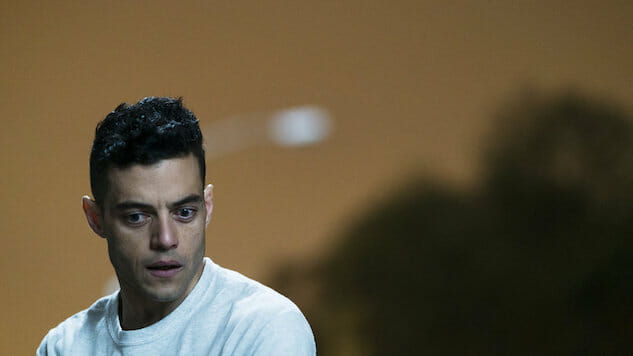Mr. Robot‘s Season Three Premiere Signals a Return to Form
(Episode 3.01)
Photo by Michael Parmelee/USA Network
Who made who? Was Mr. Robot the show we wanted—the show we were desperate for? Was it an answer to an unspoken question? Or was it a lucky accident: a television show that leaned into the zeitgeist so hard that it came out the other side? Is it L.A. Law or M.A.S.H? Having just seen the first episode of Season Three, “eps3.0_power-saver-mode,” I don’t know if Mr. Robot will return to the glories of its first run, but it seems willing and ready to seize whatever heights are available to it in its third season.
Here’s what I will tell you: the noir is twisted rope-tight, and the cut-glass sharpness that drew us in the first time is back in full swing. The Dark Army is on the move, and so is our cast—after the car-chasing of the first and second season, each of the better angels seems to be at one another’s throats. That’s to be expected; nobody makes these kinds of stories without at least one double-cross. I can confirm that Internet favorite Darlene (Carly Chaikin) is still frayed at the edges and projecting bravado, and that Angela (Portia Doubleday) has the shell-shocked thousand-yard stare of the purposefully broken. And of course, Young Hamlet and his Ghost Father are still grappling for supremacy: Elliot Alderson (Rami Malek) and Mr. Robot (Christian Slater) are as far along in their relationship as can be expected with the end of Our Capitalist World gunning down on them. I’ll skip the Wellicks for the moment. You want to know if the taste is still there, perhaps. The constant vaporwave air, the full-frontal sense of dread. I can confirm the mood is back. It is 2015 in Mr. Robot: in the room billionaires come and go, and talk of our lives one President ago.
We can’t talk about the first episode without discussing the two years behind it. So, let’s palaver on that subject. A series like Mr. Robot lives and dies on its designated audience (that’s you, reader, who are probably the college-educated, savvy, urbane audience of any marketer’s dreams) holding a specific set of beliefs about the series and its makers.
We forgive the authoritarian dictates of serialized, moving-picture entertainment because we (the audience) believe the writers, directors, and plotters Know What They Are Doing. Why did we start watching creator Sam Esmail’s TV show? Speaking as one of those watchers: If I articulated the articles of faith that cling to the viewership of Mr. Robot, they’d read like this: The show is wiser, sleeker, more cynical than you. “As sharp-eyed and jaded as you are, my friends,” Mr. Robot tells us, “I am more so. Soon you will be as I am.”
Much of the charm of Esmail’s postmodern thriller was that it projected a compelling worldliness. At first glance, Mr. Robot seemed bone-deep wise and up-to-your-neck hip about, well, everything. The series threw off the disillusioned radiations of a blogger who’d read every single dispatch of the Panama Papers. It was pendulous with knowledge of power and the intricacies of economic predation. Deadpan wit was baked into it so deep, you could break your teeth on the damn thing. The story transcended the canons of its skepticism; it was cynical about its own cynicism. It had all the hope of a fourteen-year-old Radiohead fan, hidden behind a crusted surface of studied indifference. If I’m waxing nostalgic about a show that’s still new in the annals of entertainment, that’s because you can’t understand Mr. Robot without knowing what it was at first, how it was in its second year, and how it might be again. Whenever a series preaches new heaven and new earth, keep your eye on the plot holes.
Off the top of my head, it’s hard to remember a show with a better first season. Or a more anticlimactic second season. 5/9 arrived. Millennium approached. What then? Esmail and his crew didn’t really have an answer in 2016. So, here’s what Season Two gave us: fsociety rudderless in the storm, Tyrell undead, tensions unknotted, Elliot deluded about jail.
By Season Two, all the initial big-wheel wowserism that locomotived Esmail’s series into critical and popular acclaim was wearing off. Because here’s the thing: If your show’s strong points are a perfect sense of taste and true knowledge of a fallen world, you can’t make a single misstep. Glee got away with its wander-lost second season because it never affected insight into its own condition. Mr. Robot can’t afford cluelessness: Being clued in is the very bag we came for. From what I can tell, the show will still delight with excellent foreboding. The mother-tongue of romantic cynicism, which is the common lingo of the learned in the twenty-teens, is still spoken on Mr. Robot. Bit by bit. The final form of the compiled program is anyone’s guess.
Jason Rhode is a staff writer for Paste. Unlike Elliot, his Christian Slater is very real. He’s on Twitter @iamthemaster.







































